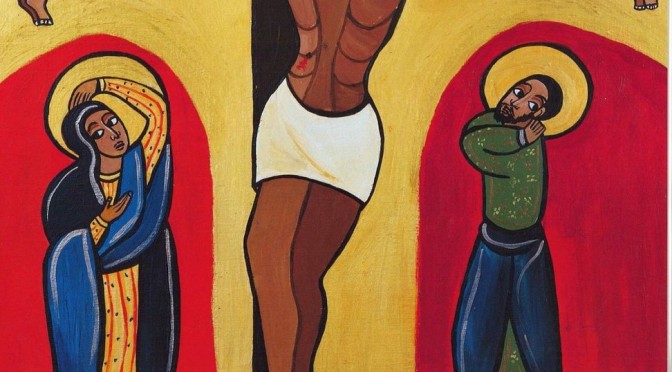Caitlin Trussell with Augustana Lutheran Church on October 26, 2025 Confirmation and Reformation Sunday
[sermon begins after two Bible readings]
21 But now, apart from the law, the righteousness of God has been disclosed and is attested by the Law and the Prophets, 22 the righteousness of God through the faith of Jesus Christ for all who believe. For there is no distinction, 23 since all have sinned and fall short of the glory of God; 24 they are now justified by his grace as a gift, through the redemption that is in Christ Jesus, 25 whom God put forward as a sacrifice of atonement by his blood, effective through faith. He did this to demonstrate his righteousness, because in his divine forbearance he had passed over the sins previously committed; 26 it was to demonstrate at the present time his own righteousness, so that he is righteous and he justifies the one who has the faith of Jesus.
27 Then what becomes of boasting? It is excluded. Through what kind of law? That of works? No, rather through the law of faith. 28 For we hold that a person is justified by faith apart from works prescribed by the law.
[sermon begins]
Parenting is a strange task. Older humans caring for the tiniest humans, born with their own personalities and daily rhythms. Our son arrived as an immediate night owl who slept in. Our daughter was an o-dark-thirty, morning baby. We celebrated when she started sleeping until 5 a.m. Younger humans are their own people with their own God-given gifts and their own sins in which Jesus meets them. Yes, even my children. A friend of mine greets babies with, “Oh, aren’t you the cutest little sinner.” Hearing the moniker of “sinner” cooed at a baby is jarring but gets at an essential truth. Human creatures WILL hurt themselves and others thinking they know better than God. It’s going to happen no matter how special and good humans are. And human creatures WILL do wonderful things. It’s going to happen no matter how broken the human is.
As parents, the combination of saint and sinner in our children can be hard to experience and to witness. Oh sure, sometimes it’s comedy with lots of laughs. Sometimes it’s also tragedy and there are no words or kisses to make it better. Such is life for parents and for young humans – just when you think you know something, either the thing changes or you do, and grace for self and others is needed along with the natural consequences of our actions.
In that way, there are some similarities with Augustana’s young people studying towards Confirmation. Each is their own person with their own God-given gifts and their own sins in which Jesus meets them. There is comedy and there is tragedy – laughter and tears and sometimes both at once. I sometimes wonder if the age of Confirmation in the mid-teens is the “right” time. And then I end up wondering if it might not be the best time because their questions are enormous and honest.
They ask questions about self and God and the world. Questions about fantasy and faith. Questions about myth and truth. In the Rite of Confirmation, the student takes on the promises of baptism that their parents made to them so long ago:
To live among God’s faithful people.
To hear the word of God and share in the Lord’s Supper.
To proclaim the good news of God in Christ through word and deed.
To serve all people, following the example of Jesus.
To strive for justice and peace in all the earth.
They will take on these promises for themselves, affirming their baptism, and they will continue asking questions of faith as baptized people awash in grace.
Jesus cuts to the chase about truth in the Bible reading from the Gospel of John:
Then Jesus said to the Jews who had believed in him, “If you continue in my word, you are truly my disciples; and you will know the truth, and the truth will make you free.”[1] Truth and freedom. They’re compelling on a gut level until you start trying to figure out the truth. A little like Pontius Pilate a few chapters later. He asks Jesus at the trial before the crucifixion, “What is truth?” A lot of us ask that question with Pilate. We want to know the truth.
Jesus goes on to say, “Very truly, I tell you, everyone who commits sin is a slave to sin.”[2] Slavery language is tough enough when we talk about historical or modern-day slavery, but it can make us downright uncomfortable when we use it to talk about ourselves. Maybe one place to start is to get used to the truth that each of us is simultaneously saint and sinner. Daily, we are sainted through the waters of baptism and daily we struggle with the next right step out of those waters.
Jesus tells his Jewish followers to continue in his word, assuring them that they will know the truth that will free them. Part of this truth is that we are slaves to sin in need of grace. If I’m honest in my demand for truth, then I’m also honest about the truth of who I am and the enslavements that bedevil me. The truth is that given the right set of circumstances, most of us are capable of just about anything. Our sisters in Christ in New Beginnings Worshipping Community at the Denver women’s prison know this better than anyone. It’s a powerful thing to sing with them, praise hands in the air, about justice and unconditional grace through the cross of Jesus. Those of us living outside the walls have a harder time seeing the truth of our need for grace. Another part of the truth, maybe the harder part, is that we need a liberator. Slaves do not typically free themselves. But we’re inclined to talk like the religious leaders in the Bible story. We’ve never been slaves to anyone – what do you mean we’ll be made free?![3]
It’s interesting that it’s easier to understand the Jewish followers questioning Jesus than it is to understand Jesus. Although it’s a little surprising that they ignore their ancestors’ enslavement under Pharoah and freedom led by Moses as they ask Jesus, “What do you mean, ‘made free?” At our youngest ages this question first comes out as, “Why?” From then on, that question doesn’t stop. We ask it over and over as children. As people of faith, as people of church, we continue to ask it. Questions seek answers. Faith seeks understanding.[4]
In seeking understanding, our faith is formed. Faith, given by God, is formed by experience and intellectual exercise, by comedy and tragedy, by people around us, and by more than I can think of right now. How do we imagine that Martin Luther was able to hammer those 95 theses onto the door of a German church, issuing a challenge, a theological smack-down to the church leaders of his time? Luther’s experience, intellect, friendships, suffering, and his determination to wring good news from the Bible contributed to the world changing event of the Reformation. In the 1500s, translating the Bible into everyday language was a crime against the Holy Roman Empire. Theologians before and in Luther’s time were executed, even burned at the stake, for translating the Bible into the common language.[5] Luther managed a full translation of the Bible into German while protected to do so.
The Bible is a library of 66 books written by many people over thousands of years. Imperfect people wrote it and they disagree with each other between books and sometimes in the same book. They wrote about their experience of God and Jesus, and their stories in light of those experiences. There is power working through that book casually sitting in the pews and in our homes. But we do not worship this book that we call the Bible. The Bible is not Jesus.
We may revere and respect the Bible but we do not idolize the Bible. We do not say the Bible is God. We experience it as God’s Word. The Holy Spirit works through the Bible to form faith as the Holy Spirit works through our families and each other as the church to form faith. Luther could do what he did in part because of his relationship with his family and his church. He was formed by asking questions of faith and the church. And then he turned the church of the Holy Roman Empire upside down with the clarity gained through his formation. Never underestimate the power of asking, “What does this mean?”
Confirmation students, keep asking “What does this mean?” And remember your questions. Keep asking them. There are people of all ages, times, and places asking similar questions. Parents and church faith formation teachers, keep holding space for challenging questions and conversations even if there are no answers. These young people ask honest questions hoping for good news. Faith seeking understanding is faithful and good. It changes lives. It changes the world. It changes the church. Because isn’t reformation about change? Changing our hearts through faith, drawing us closer to God, and aligning us to God’s will and mission for us today as God’s grace is poured out to us and through us by Jesus.
Jesus frees us through our baptisms and God promises to:
Always be with us even, and maybe especially, when we don’t feel God.
Always take us back by grace, even when we turn away from God.
Always work to make our lives ever more Christ-shaped.
And to keep these promises forever.
Children of God, in baptism you are sealed by the Holy Spirit and marked with the cross of Christ forever.[6] Jesus sets you free and you are free indeed. Amen and thanks be to God.
___________________________________
[1] John 8:31-32
[2] John 8:34
[3] John 8:33
[4] Sze Zeng, “Where Did the Phrase “Faith Seeking Understanding” Come From?” theology + life on October 12, 2010. http://szezeng.blogspot.com/2010/10/where-did-phrase-faith-seeking.html
[5] Rolf Jacobson, Karoline Lewis, and Matt Skinner podcast conversation on John 8:31-36, October 25, 2015 for WorkingPreacher.org. http://www.workingpreacher.org/brainwave.aspx?podcast_id=805
[6] Evangelical Lutheran Worship. Holy Baptism. (Minneapolis: Augsburg Fortress, 2006), 231.

![Sin and Grace, Saint and Sinner – What Does This Mean? [Confirmation and Reformation Sunday]](http://caitlintrussell.org/wp-content/uploads/2025/10/surprised-baby-672x372.jpg)

![Rise and Sing Again [OR Mortality, Music, and Meaning] – Ash Wednesday Joel 2, 2 Corinthians 5, and Psalm 51](http://caitlintrussell.org/wp-content/uploads/2023/02/Ken-Phillips-Banner-Art-3-of-12.--672x372.jpg)
![Good Friday is for Weary Souls [OR The Life-Giving Heart of God] John 18:1 – John 19:42 and Psalm 22](http://caitlintrussell.org/wp-content/uploads/2022/04/Laura-James.-Jesus-Mother-Beloved-Disciple.-Cross-Crucifixion-672x372.jpg)
![Ask the Complicated Questions [OR A Sermon for Reformation Day] John 8:31-36](http://caitlintrussell.org/wp-content/uploads/2021/10/mumeration-of-starlings-1-672x372.jpg)

![Practical Hope for Life Today [OR Listen, God is Calling] Mark 6:14-29 and Ephesians 1:3-14](http://caitlintrussell.org/wp-content/uploads/2021/07/receipt-hands-sermon-caitlin-trussell-672x372.jpg)
![Seek. Find. Joy. Repeat. [OR What’s Up in the Lost and Found?] Luke 15:1-10 and 1 Timothy 1:12-17](http://caitlintrussell.org/wp-content/uploads/2019/09/Lost-Sheep-Lost-Coin-by-Kazakhstan-Artist-Nelly-Bube.-500x372.jpg)
![Just Poking Around [OR Longing for Restoration] John 20:19-31, Acts 4:32-35, 1 John 1:1-2:2](http://caitlintrussell.org/wp-content/uploads/2018/04/Shopping.Just-Poking-Around.sermon-Caitlin-Trussell-560x372.jpg)
![We Can’t Handle the Grace, A Sermon for Good Friday [John 19.16-18 and 25b-30 and 40-42]](http://caitlintrussell.org/wp-content/uploads/2018/03/Crucifixion.Georges-Rouault.Le-Christ-en-Cross.1936.Collection-of-Saint-Marys-Museum-of-Art.Gift-of-the-Stricker-family.Sermon-Caitlin-Trusselljpg1-447x372.jpg)